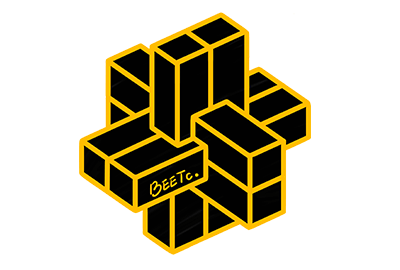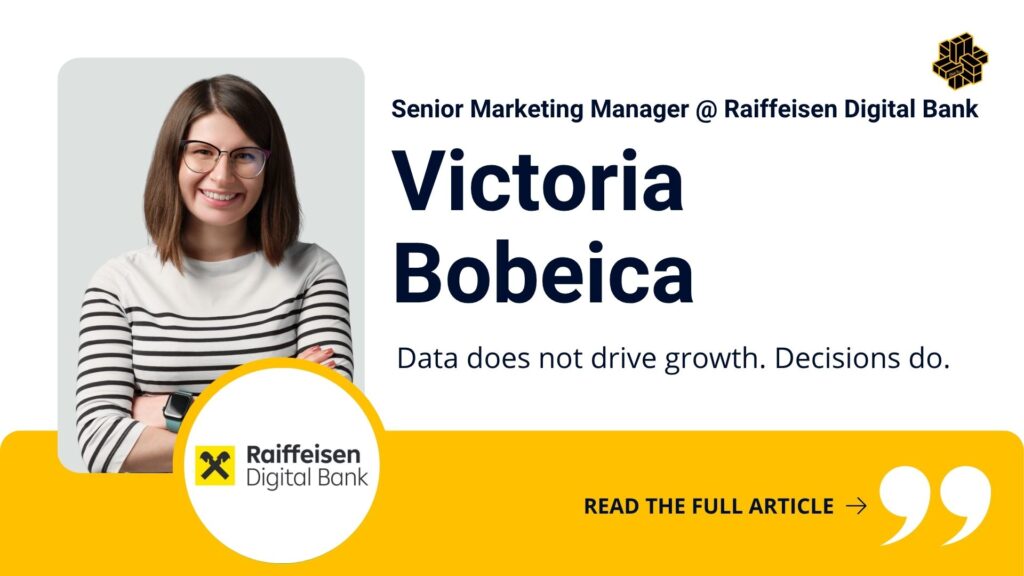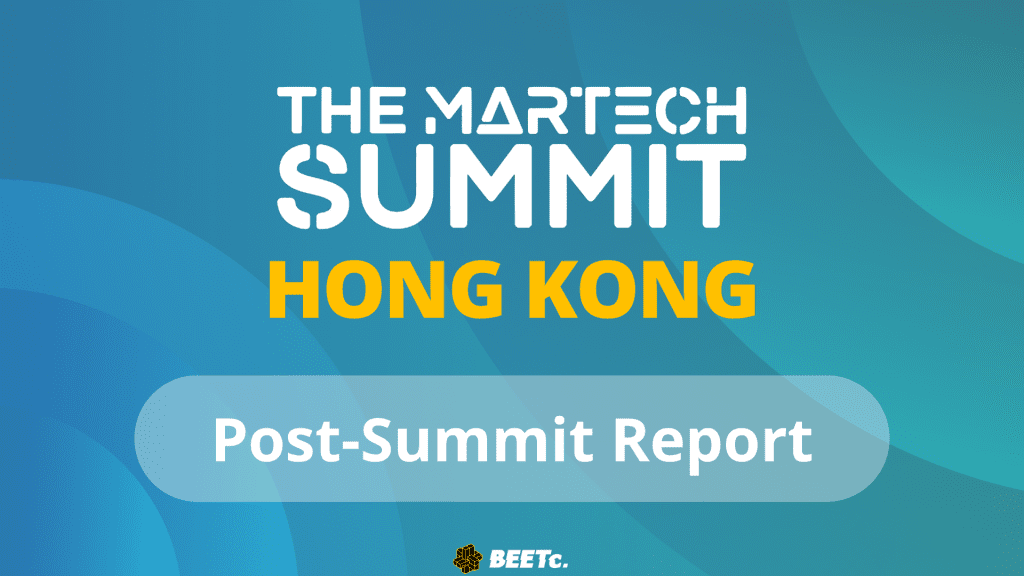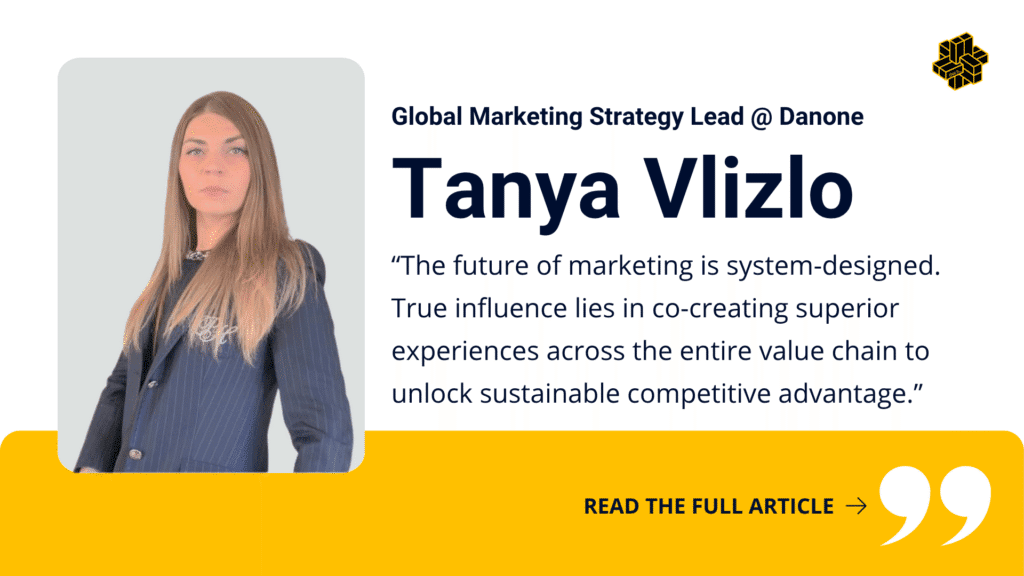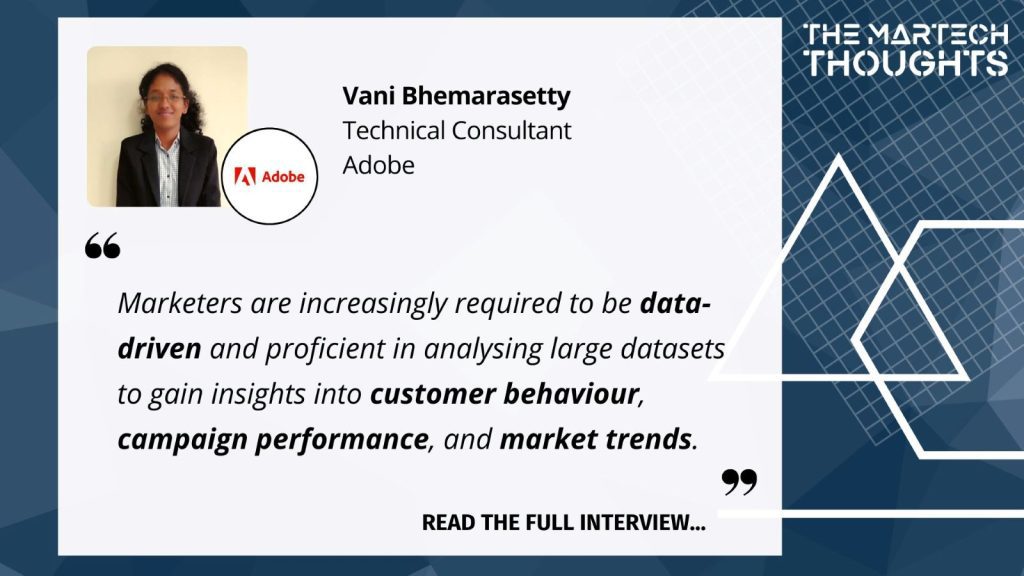
Welcome Vani Bhemarasetty, Technical Consultant from Adobe, sharing her insights on MarTech Skillsets, Marketing Automation & Future Trends, as part of the MarTech Thoughts series.
What is your industry? And how would you explain your job to a 5-year-old?
Technology & Software.
Sure! Imagine you know a lot about really cool computer stuff, like the ones you use to play games or watch videos. Well, my job is like being a helper for a special company called Adobe. They create amazing things that let people make pictures, videos, and websites on the computer. As a technical consultant, I help make sure that everything works smoothly and that people understand how to use these fantastic computer tools. It’s like being a friendly wizard who helps make magic on the computer so that everyone can have fun and create awesome things!
What is the one marketing platform/app/solution you can’t live without? Why?
LinkedIn, as a technical consultant at Adobe working on digital experience SAAS solutions, I find LinkedIn to be a crucial platform for several reasons: Professional Networking, Industry Insights and Knowledge Sharing, Building Personal Brand and Credibility, Industry Events and Webinars.
Currently, what are you primarily looking for in your digital marketing efforts? Awareness or engagement? Why?
It has got to be engagement.
Once a certain level of awareness is established, the focus might shift toward engagement. Engagement campaigns aim to interact and connect with the target audience on a deeper level. This could involve encouraging users to like, comment, and share content, sign up for newsletters, participate in surveys or contests, or even make inquiries or purchases.
Engagement is crucial for building a loyal customer base and fostering brand advocacy. KPIs for engagement campaigns might include metrics such as likes, comments, shares, click-through rates, and time spent on the website.
At your organisation, what tasks in marketing are good to automate and what tasks still need a human touch?
Email marketing automation, social media scheduling, data analytics & reporting can be automated. However, content creation, brand messaging, crisis and reputation management, personalization & customer interactions still need a human touch.
What are some of the significant changes to your customer outreach and retention strategies? And how has it impacted the growth plan for upcoming years?
Some of the latest significant changes that I am observing in the market have to be, personalization at scale, multi-channel engagement, AR, VR, emphasis on customer advocacy, contextual marketing, and proactive customer support. These changes have definitely had an impact by increasing customer loyalty, customer lifetime value, competitive advantage, and long-term sustainability.
How do you see the skillsets needed for the marketing profession changing?
Data Analytics and Interpretation: Marketers are increasingly required to be data-driven and proficient in analyzing large datasets to gain insights into customer behavior, campaign performance, and market trends.
AI and Machine Learning, Customer Experience Management, Content Strategy and Storytelling, Ethical Marketing, and Data Privacy: As data privacy concerns grow, marketers need to be knowledgeable about ethical marketing practices and comply with relevant regulations.
How do you keep your team motivated to get the best out of them during challenging economic times with additional external pressure?
I motivate my teams by promoting transparent communication, setting realistic goals, recognizing efforts, providing professional development, and fostering a supportive work environment. Empowering autonomy, offering flexibility, and celebrating successes are also essential. Addressing concerns, encouraging innovation, and maintaining work-life balance contribute to team resilience. Keeping an eye on employee morale and promoting a sense of purpose are crucial in navigating external pressures successfully
How do you monitor the effectiveness of your audience segmentation?
Monitor audience segmentation through data analysis of KPIs, A/B testing for message effectiveness, customer surveys for feedback, customer profiling for ongoing refinement, and tracking segment-specific campaign performance
What would your company use AI the most for?
Create scaled hyper-personalised content!
What will be the next evolution in marketing technology that we can expect in the coming years?
In the coming years, marketing technology is expected to see significant advancements.
AI-driven personalisation will enable hyper-targeted content, while voice and visual search optimization will cater to changing search behaviors.
AR and VR experiences will revolutionize customer interactions, and blockchain will enhance transparency and data security.
IoT and 5G will enable context-aware marketing, and chatbots will become more human-like.
Data privacy and consent management will be critical, and emotional analysis will gauge customer sentiment.
Sustainable and ethical marketing tools will address growing consumer demands for sustainability.
These developments will shape the future of marketing technology and customer engagement.
What are the key challenges when it comes to implementing Chatbots for the first time?
The key challenges of implementing chatbots for the first time include understanding user needs, dealing with the complexity of natural language processing (NLP), gathering and training sufficient data, integrating with existing systems, and ensuring a seamless user experience. Developing accurate responses and avoiding misinterpretations are essential for effective communication. Additionally, addressing potential security and privacy concerns and managing user expectations are critical for successful chatbot deployment.
What is the best use of technology you have seen during this time of uncertainty and changes?
During this time of crisis, one of the best uses of technology has been in the healthcare sector. Telemedicine and remote health monitoring solutions have enabled patients to receive medical consultations and care without physically visiting healthcare facilities, reducing the risk of exposure to infectious diseases. Additionally, AI-powered algorithms have been used to analyze medical data and provide insights for better diagnosis and treatment planning. These technological advancements have played a crucial role in maintaining healthcare services and ensuring the well-being of patients during challenging times.
What is the scope of using AI and machine learning in Marketing Mix Modelling?
AI and machine learning offers vast scope in Marketing Mix Modelling, enabling advanced data analysis, accurate attribution modelling, real-time insights, and predictive modelling. These technologies can handle complex and large datasets, providing a more comprehensive understanding of marketing performance and optimizing resource allocation. AI-driven models improve decision-making, enhance ROI measurement, and adapt to dynamic market conditions, making MMM more effective and efficient.
How could a marketer start utilising the Metaverse?
To utilize the Metaverse as a marketer, begin by understanding the concept and identifying relevant platforms. Establish a virtual presence with branded spaces and engage with the audience through events and interactive experiences. Explore virtual advertising opportunities and monitor performance through metrics and user feedback. Embrace innovation and be open to experimentation, as the Metaverse is still an evolving space. Staying informed about its developments is crucial for success in this emerging marketing landscape.
With the advancement of AR & VR, how do you see these being utilised in Digital Storytelling?
With AR and VR advancements, digital storytelling becomes more immersive and interactive. Audiences can participate actively in narratives, experience virtual tours of distant locations, and visualize stories with augmented elements. These technologies enrich storytelling by providing engaging experiences that blend the real and virtual worlds, offering new possibilities for content creators to captivate their audiences.
What is your strategy to link up traditional and modern trade ecosystem?
To link up the traditional and modern trade ecosystem, integrate technology such as cloud-based systems and data analytics.
Implement mobile applications to enhance connectivity and efficiency.
Foster collaboration and partnerships between traditional retailers and modern e-commerce platforms.
Utilize omnichannel strategies to provide a seamless shopping experience for customers.
Provide training and support for traditional retailers to embrace digital tools and methods.
Leverage customer data to tailor marketing and sales strategies across both channels.
How would you use a million pounds?
It has got to be entrepreneurship. Will Invest in starting a business or supporting innovative projects with potential for growth and social impact or become a VC and invest in really good startups that are solving real-world problems
What’s the best advice someone has ever given you?
“The only way to do great work is to love what you do.” – Steve Jobs. Although it is not direct advice, but I strongly resonate with Steve Jobs’s words on doing what you love
A big thank you to Vani Bhemarasetty for sharing her insights and experiences on MarTech Skillsets, Marketing Automation & Future Trends!
If you want to connect with Vani after reading her MarTech Thoughts, please reach out to her via her LinkedIn Profile!
See more MarTech Thoughts interview posts here: https://themartechsummit.com/category/martech-thoughts/
Last updated: Aug 2023
